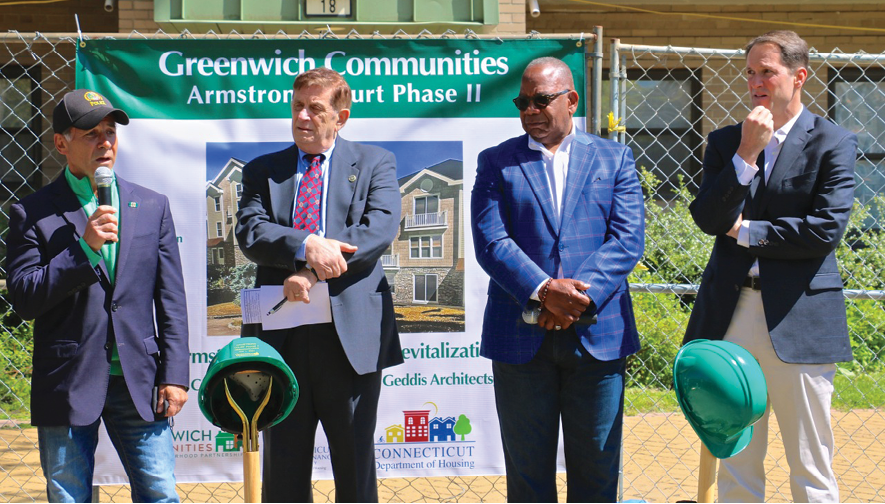“Affordable housing” probably isn”™t the first thing to spring to most minds when thinking of Greenwich. But Anthony Johnson, CEO and executive director of Greenwich Communities ”” formerly the Greenwich Housing Authority ”” is on a mission to alter that.
And he is receiving some rave reviews, particularly for what he and his organization have done with Armstrong Court.
Built in 1951, the six-building, 144-unit complex had not been rehabilitated until about eight years ago, when Johnson said he began “trying to get funding and designs for the property to do what we wanted to do.”
Over the ensuing years, Johnson told the Business Journal, he “applied for funding multiple times.”

Ultimately the project received support from the state, the Connecticut Housing Finance Authority and Department of Housing (DOH). The housing finance agency is investing more than $16 million in tax-exempt bonds while the Housing Department has invested $12.2 million, and tax credit syndicator Enterprise has bought $18.1 million in 4% and 9% low-income housing tax credits.
Johnson noted that a number of private investors, including utility Eversource, have also bought state tax credits.
Phase I of the project began in May 2019 and was completed in June 2020, with newly built townhouses at the cost of $15 million. The second phase, the complete renovations of the 42 units in buildings 1, 3 and 6, is now underway.
Phase III, a single building of 42 units, will start construction in late 2021 or early 2022 with an expected cost of around $25 million. All told, the three phases represent an investment of $64 million.
Rehabbing includes enclosing the exterior catwalks on the property and turning them into living spaces. “They”™re called ”˜porches”™ ”” they look like a porch ”” but they”™re really fire escapes,” Johnson said. Flat concrete roofs are being pitched for better drainage and energy efficiency. “In the past, in the summer, they were like red-hot potatoes,” he said.
All bathrooms, kitchens, walls and flooring are being replaced, and an HVAC system will replace the window units that have dotted the exterior for years.
The site”™s absence of handicapped access is also being addressed.
Johnson said the name change from the Greenwich Housing Authority to Greenwich Communities, which took place last September, was meant to underscore “how we are a community, even though Greenwich has nine neighborhoods” as well as to combat what he said was the fact that “the word ”˜authority”™ gives people angst and makes them nervous.
“We want people to be proud of where they live and not feel the stigma of living under a housing authority,” he said.
The organization oversees approximately 1,240 affordable housing units across nine properties in the town.
“We have the support of the people,” Johnson said. “A lot of the time, in Fairfield County and around the country, you hear people say they support affordable housing, but not in their own backyards. That isn”™t the case here.”
”˜Something to take pride in”™
Among those supporters are U.S. Rep. Jim Himes, state Reps. Stephen Meskers (D-Greenwich) and Kimberly Fiorello (R-Greenwich) and a host of other state government officials who attended a March 1 groundbreaking ceremony to celebrate the beginning of Phase II. Johnson said he hoped that the unusually large and prestigious group would send the message that, “The more people who are attracted to what we”™re trying to do will help us with our further development plans in the future.”
Also in attendance was First Selectman Fred Camillo, who told the Business Journal that he remembered visiting his grandmother at Armstrong Court as a child.
“It”™s amazing how far we”™ve come,” he said. “It was always a great place but it certainly was overdue for some work to restore it and make it something the town can take pride in.”
Camillo also took time to address the controversial Senate Bill 1024, whose aim is, depending generally on one”™s political persuasion, either a much-needed alteration to affordable housing rules (Democrats) or an attempt to steamroll over local housing authorities to establish a “one size fits all” mandate (Republicans).
Camillo ”” a Republican who served in the Connecticut House of Representatives from 2009 to 2019 ”” said SB 1024 and its supporters were “trying to chip away at local zoning. The diversity of our towns and cities is one of our state”™s strengths. I certainly don”™t want every town and city looking the same.”
He went on to deride “Yale law school professors” for pushing for the bill, a reference to Sara Bronin, founder and lead organizer of DesegregateCT. That group has held numerous events around the state arguing that its true aims have been mischaracterized by opponents. Bronin, who received a law degree from Yale Law School, has taught at the UConn School of Law and served as a visiting professor at the Yale School of Architecture.
The first selectman also confirmed that he is running for reelection in the fall.
“I said when I ran the first time that if people felt I had done a good job at the end of my term, I would run again,” Camillo said. “We still have to move the ball down the field on some issues, some of which are on the goal line and others where there”™s still some work to be done.”



















